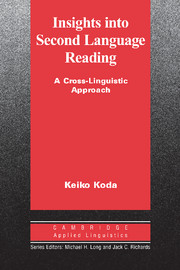11 - Comprehension assessment
Published online by Cambridge University Press: 05 October 2012
Summary
To recap, reading is a complex, multifaceted pursuit requiring the continuous deployment and integration of multiple operations. A longstanding conviction holds that adept reading is a constellation of interfaced capabilities, ranging from mechanical mappings to more sophisticated conceptual manipulations, such as reasoning and inference. It is not surprising, consequently, that assessing something of such complexity requires a clear consensus – which continues to remain elusive – about what constitutes reading ability. Currently, contradictory conceptions of comprehension govern assessment designs, resulting in a variety of approaches.
In L2 assessment, moreover, additional factors compound the complexity. Traditionally, reading is viewed as an integral aspect of language proficiency, and thus assessment continuously mirrors the prevailing definition of L2 proficiency. Recently, for example, the core element in L2 proficiency has shifted from discrete, decontextualized linguistic knowledge to communicative competence. Parallel shifts reflecting this change have also occurred in L2 reading assessment. Earlier emphasis on linguistic variables (e.g., lexical and syntactic complexity and/or familiarity) as the critical determinants of comprehension difficulty has substantially diminished. Instead, factors bearing on communicative, meaning-making intent (e.g., reading purposes and text content) have gained considerable prominence.
To understand current practices, the fundamental principles underlying disparate assessment procedures need further clarification. This chapter elucidates the conceptual bases of widely used assessment approaches. Following a description of the contrasting views on reading comprehension, the chapter considers their implications for test design and development.
Information
- Type
- Chapter
- Information
- Insights into Second Language ReadingA Cross-Linguistic Approach, pp. 227 - 253Publisher: Cambridge University PressPrint publication year: 2005
